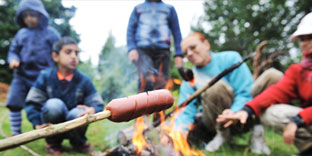In March, a forestry management project began at J Edward Mack Scout Reservation. This project is being undertaken under the direction of a Certified Forester following recommendations included in an updated Forest Management Plan for the camp. Work will take place in campsites and program areas, and will focus on removing standing dead timber and infected oak trees, along with improving the overall health of the forest. Here is a note from our forester with more information:
A fungal complex has infected Chestnut Oaks and to a lesser extent the other oaks in the same stands. There is evidence of several fungi involved and they have likely transmitted between host trees through spore travel, root grafting, insect carriers, and other potential means. This is not an uncommon occurrence in the forest, but the strain or strains of fungi that have infested the trees over the last 2-3 years has been particularly aggressive. This has been happening in the region and is not limited to Camp Mack. The areas impacted at Camp Mack are predominantly forested by Chestnut Oak. This has resulted in a large number of dead or dying trees in the program and camp site areas. To date we have not found a Chestnut Oak that is not infected. Live trees that are infected will most likely die in the next few years. This is a significant safety issue for the camp’s users. Due to this we have been assessing the health of the trees in those areas and removing them.
This project will be cost neutral for the Pennsylvania Dutch Council. We are paying the forester and logger, and will receive money back from the sale of timber to cover those costs.
Benefits of Active Forest Management Include:
- Reduced Forest Fire Risk;
- Reduced danger to hikers, campers, and other forest users by reducing standing dead timber;
- Improved growth and development of new plants;
- Reduced impact of invasive species;
- Improved tree health and reduced impact of disease;
- Improved wildlife habitat;


 Join Today!
Join Today!
 Events Calendar
Events Calendar
 Resource Center
Resource Center
 News Room
News Room
 Things To Do
Things To Do
 Give Now
Give Now
Leave a Reply